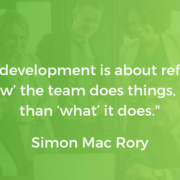Building Teams By Doing Meaningful Work
 This blog is a guest post by Simon Mac Rory as a companion to the podcast where he talks about his latest book, Wake-up and Smell the Coffee: An Imperative for Teams.
This blog is a guest post by Simon Mac Rory as a companion to the podcast where he talks about his latest book, Wake-up and Smell the Coffee: An Imperative for Teams.
Alison Green, advice columnist, consultant, and author of the Ask Manager website, had a very interesting article on the BBC news website recently entitled Why corporate team-building events can be terrible – (see article at https://www.bbc.co.uk/news/business-45260246). I couldn’t agree more with her, and in my recent book “Wake up and Smell the Coffee – The Imperative of Teams, I address the same issue in a chapter debunking the myths around teamwork. Here is an excerpt from the book on the issue.
Offsite team building can take time away from ‘real work.’
Suggest a team building session; immediately, the outdoors springs to mind. Contrary to popular opinion, I am convinced they do not help deliver an effective team. There are many variations of this, some even run by ex-special elite soldiers. Primarily they are based on completing group exercises and challenges, supposedly developing team spirit and effectiveness.
A trust circle at an off-site event!!!!!!
Every team member is encouraged to participate equally by the facilitator; the work team leader no longer has the same level of power as this is ceded to the facilitator. The team is given clear and precise goals and directions. This is not the norm at work. The degree of psychological safety is higher at these events (controlled by the facilitator), and everyone’s opinion tends to be heard. No idea is considered too wacky, as most of the tasks are wacky in the first place. Credit for new ideas and novel solutions is given as the ideas are developed. Based on this more engaged way of interacting, the team becomes increasingly successful at the tasks as the day progresses.
When they return to the workplace, they face the leader reasserting their control again, not being heard, lacking clear goals and roles, suggestions and solutions being knocked, and ideas being stolen.
What is happening with these outdoor events?
The number one problem with these sessions is their capacity to create an expectation that the team can work better together. The sessions are carefully constructed – I know because I used to deliver them at one time – precise instructions and clear objectives are given for each exercise. For starters, this is not the norm in the workplace. Often, the exercises bear no resemblance to any work-related task that the team carries out. As the day progresses, the tasks get more difficult, and most teams do complete the tasks successfully because they are designed to be completed successfully.
The outcome is a team in high spirits and delighted with their success. They are full of energy and drive to return to the workplace and prove their effectiveness with this new-found capacity to work together. But, when they return to work, lo and behold, nothing has changed. The frustration levels rose very quickly as the team members recalled how well they had worked together at the offsite but could not make it happen. The frustration levels rise accordingly, and often, the opposite of what was intended is the reality. The team is less effective and more fractious.
The offsite is a false environment. Not only do the tasks not represent the normal work of the team, but the conditions in which they happen are also not representative!
Real team development that delivers sustainable development and effectiveness happens in the workplace. Teams that take time to think about how they do things rather than what they do can always develop more effective means of working together. Teams that address goal and role clarity, planning and evaluation, composition and structure, appropriate leadership style and participation, conflict management and performance recognition, communication, and trust are the teams that will not only deliver more but will create a psychologically safe environment as a platform for their effectiveness. All of this occurs in the workplace, not outdoors or at wild and wonderful offsite events.
Team development is not about time away from real work, rather it is about the time correctly given to reflection on ‘how’ the team does things, rather than ‘what’ it does. It can and does take place during normal work hours, where it is far more effective and does not serve to embarrass and compromise any team member. Think carefully before organizing outdoor events/offsites regarding the team members and their dispositions. Remember, it is not about fun but about addressing the real issues driving team effectiveness.
About the Author
Simon Mac Rory is a specialist in team development. He works with senior staff leaders to help them discover that edge to becoming a truly high-performing team. Over his 30-year career, he has worked globally with a blue-chip client base in both the private and public sectors.
He founded The ODD Company in 2011 to deliver TDP (a cloud-based team development tool and methodology) to the international markets. Simon
operates the business from London with a Dublin-based development and support office.
Simon received a doctoral degree for his work on applying generic frameworks in organizational development and is a Visiting Research Fellow at Nottingham Business School.
Follow Simon on Twitter @SimomMacRory


Leave a Reply
Want to join the discussion?Feel free to contribute!